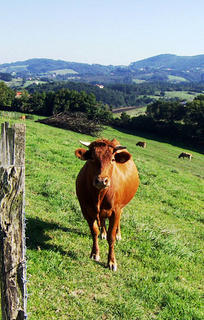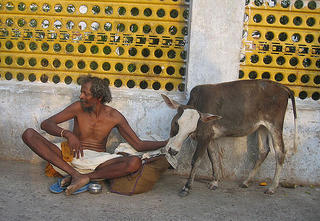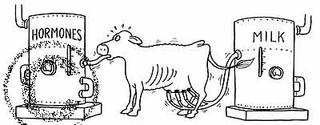View From a New Vrindaban Ridge
An unofficial, eclectic, mostly tangential, view of aspiring devotee life.
Best viewed with Sense of Humor 8.0 or higher.
Cows may come, cows may go, but the bull is always here.
Monday, October 31, 2005
Sunday, October 30, 2005
Subject to Illusion
Found on the web:
This should be proof enough, we don't always see what we think we see.
(continued)
If your eyes follow the movement of the rotating pink dot, you will only see one color, pink. If you stare at the black + in the center, the moving dot turns to green. Now, concentrate on the black + in the center of the picture. After a short period of time, all the pink dots will slowly disappear, and you will only see a green dot rotating if you're lucky!
It's amazing how our brain works. There really is no green dot, and the pink ones really don't disappear. This should be proof enough, we don't always see what we think we see.

Saturday, October 29, 2005
NPR to Feature Vrindavan Soundscapes
NPR/NATIONAL GEOGRAPHIC'S "RADIO EXPEDITIONS" VISITS HEAVEN ON EARTH - THE ANCIENT INDIAN CITY WHERE KRISHNA FOLLOWERS BELIEVED HE LIVED - IN THREE-PART SERIES AIRING ON "MORNING EDITION" OCTOBER 31-NOVEMBER 2
Alex Chadwick Explores Vrindavan, India, and Its Role on Hindus' Beliefs in the Afterlife
Washington, D.C. -- Is there really heaven on earth? For the latest NPR/National Geographic "Radio Expeditions" series, "Geography of Heaven," Alex Chadwick explores Vrindavan, India, an ancient town south of Delhi that is regarded by devotees of the Hindu god Krishna as the most sacred place on earth.
"Radio Expeditions: Geography of Heaven - Vrindavan" will air on Morning Edition October 31, November 1 and November 2.
Using state-of-the-art digital stereo audio equipment, "Radio Expeditions'" travels beyond the motorbikes and diesel engines of 21st century Vrindavan and ventures through the city's countless shrines celebrating Krishna and inside the temples built by maharajas to experience Krishna traditions and rituals during the Hindu New Year.
Enriching the three-part series will be an extensive Radio Expeditions section on NPR.org providing additional information, photos, soundscapes and transcripts. Chadwick also shares his Vrindavan experience in a feature in the November 2005 issue of National Geographic magazine.
Friday, October 28, 2005
Thursday, October 27, 2005
The AND-Multiplication Error
This post is not for the faint hearted or faint faithed. It will take some mental energy so some carbo loading may be in order before beginning. Carbo loading has been going on for a long time, as has been discovered recently.
From "Oldest Noodles Unearthed In China":"The remains of the world's oldest noodles have been unearthed in China. The 50cm-long, yellow strands were found in a pot that had probably been buried during a catastrophic flood.
Radiocarbon dating of the material taken from the Lajia archaeological site on the Yellow River indicates the food was about 4,000 years old..."
Okay, now that the body is fed, let us feed the mind. You know you must be onto something when they start intelligently parodying you.
From "Origin of the Novel Species Noodleous doubleous: Evidence for Intelligent Design":
"Abstract
Penne Rigate will spontaneously insert itself into Rigatoni (order pasta) under liquid to gas transition conditions of H2O to create the previously unobserved species Noodleous doubleous. The estimated probability of this spontaneous generation event is too low to be explained by thermodynamics and therefore apparently represents intelligent design..."
The key here is to read the article, enjoy it, but then follow the The AND-Multiplication Error link. (okay, one side trip into the Flying Spaghetti Monster allowed.)
Wednesday, October 26, 2005
Free Falling
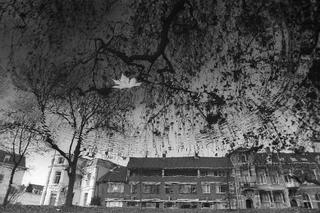
This time around it’s trips to the library,
reading everything catalogued
under bitterness and redemption.
Listening to piano adagios
in C sharp minor.
Viewing a subtitled film about releasees
from a state run institution
adjusting to life in normal land,
learning to shop and talk
without dizziness and anxiety.
Watching peony blooms
tinge brown and drop;
a growing pattern of dung
splatters under the robin’s nest
in the garage rafters.
Breathing soft air
of cushioned descent;
having been here before
it’s easier to believe
this doesn’t exist.
Tuesday, October 25, 2005
Palace of Gold On WQED Pittsburgh TV
"Tonight OnQ
MONDAY | OCTOBER 24
Also Tonight: OnQ contributor Dave Crawley tours the mystical Palace of Gold, an exotic temple built in honor of Hari Krishna founder Srila Prabhupada at New Vindraban, West Virginia.
And: OnQ viewers can attend a Krishna wedding at New Vindraban - as seen through the lens of producer/photographer/editor Dave Forstate. "
Surprising well done and pleasant segments. The wedding one included interviews with a lot of gurukulis and their curent thinking.
Monday, October 24, 2005
Sunday, October 23, 2005
DeLaval Voluntary Milking System
Just when you thought that cows couldn't possiblely be more separated from humans, along comes an even greater industrialization of the relationship.
"A 122-year-old dairy equipment company has used embedded Linux in a robotic cow-milking system (the system is robotic, not the cows). The Voluntary Milking System (VMS) allows cows to decide when to be milked, and gives dairy farmers a more independent lifestyle, free from regular milkings, the company says..."
Saturday, October 22, 2005
Friday, October 21, 2005
Natural Insect Controls
I sent the rough draft of the following to an email discussion group on the topic of harmful insect control. Some were advocating no insecticides under any circumstances.
I started a garden in an old pasture, so chemicals had not been used for? I dunno, really, then gardened it organically for 8 years. I rotated plant varieties and added wood ash, rock phosphate and lots of composted cow manure. By the end, I couldn't grow potatoes because of the flea beetles, beans because of the Mexican bean beetle, or squash because of the squash bug. This year we are fallowing practically everything, hoping to break the insects’ life cycles. According to the Bible, a piece of land should lie fallow every 7 years. That breaks insect cycles, at minimum.
Crop rotation breaks insect cycles, but just rotating small amounts of, say beans, in a quarter acre garden doesn't help as much as having the rotation be a greater difference, hundreds or more feet apart. The "monoculture" thing is not so applicable to a small plot of a one acre potato field. Monoculture is like where I grew up, where the minimum field size was generally 40 acres.
In our climate, the first Umbelliferae that blooms in the spring is lovage, a perennial. The young shoots are used as a celery substitute in soup, but it then gets quite large, with lots of flowers. Umbelliferae is the family of plants that are magnets for parasitic wasps (includes carrots, Queen Anne's lace etc). They give these beneficial wasps feedstock to multiply on so they have good populations built up when unwanted insect populations start to emerge. And no, they aren’t the types of wasps that sting people. They are mostly too small.
I put out suet blocks in the winter to help the insectivorous birds thru the harsh time, in order to maximize their populations during the summer when insects are plentiful.
We rarely or never see certain insects like horned worms or aphids, some more I can't think of off hand because they aren't a problem for me. The only place I see aphids, interestingly enough, is on some native, species, nonhybrid tobacco we grow for the intoxicatingly amazing night fragrance it throws. Tobacco preparations are used as a natural insecticide, so go figure. We use the Nicotiana sylvestris rather than the N. tobacum as it is more fragrant. Incidentally, tobacco is a sacred plant in North America. Misuse it for sense gratification, and YOU DIE!
If you don't grow everything you eat, and supplement from the store, then you are eating chemicals and voting with your money for the continuance of chemical farming. Using judicious amounts of organic insecticides besides natural controls is a step up from that. The principle of advancement is if you can't do one thing, at least do the next best thing.
Arguing against using organic insecticides or other control measures on some principle, and then going out and buying chemical produce and thinking that is okay, is hypocrisy, IMHO.
Thursday, October 20, 2005
Sacred Places, Sacred Plants

Tobacco is a sacred plant among many Native American nations. One way it is used is in the sacred pipe ceremony. Some traditions use it as 10% of the pipe mixture.
Another common way tobacco is used is in making prayer ties. The meditation is that you put your prayers into the ties as you are making them and then offer them to a sacred fire, hang them out in nature, or use them in various ceremonies.

Wednesday, October 19, 2005
Moon Siddhi
Empiricism has to do with the limited senses and mind. SB is a poetic work trying to convey larger ideas than the the senses can measure or the mind can comprehend.
"My dear Lord, You are the creator, maintainer and annihilator of this cosmic manifestation, but persons who are too materialistic and who always see separateness do not have eyes with which to see You. They cannot understand Your real position, and therefore they conclude that the cosmic manifestation is independent of Your opulence." SB 6.16.47
"As the Lord passed along the public road of Dvaraka, His head was protected from the sunshine by a white umbrella. White feathered fans moved in semicircles, and showers of flowers fell upon the road. His yellow garments and garlands of flowers made it appear as if a dark cloud were surrounded simultaneously by sun, moon, lightning and rainbows.
PURPORT
The sun, moon, rainbow and lightning do not appear in the sky simultaneously. When there is sun, the moonlight becomes insignificant, and if there are clouds and a rainbow, there is no manifestation of lightning. The Lord's bodily hue is just like a new monsoon cloud. He is compared herein to the cloud. The white umbrella over His head is compared to the sun. The movement of the bunch-hair fan of flukes is compared to the moon. The showers of flowers are compared to the stars. His yellow garments are compared to the rainbow. So all these activities of the firmament, being impossible simultaneous factors, cannot be adjusted by comparison. The adjustment is possible only when we think of the inconceivable potency of the Lord. The Lord is all-powerful, and in His presence anything impossible can be made possible by His inconceivable energy. But the situation created at the time of His passing on the roads of Dvaraka was beautiful and could not be compared to anything besides the description of natural phenomena. "SB 1.11.27
So if empiricism tells us one thing and SB tells us another, are they irreconcilable? A question worthy of elaborate discussion after all the slaughterhouses are closed down, IMHO, but here is a glimpse to tide us over.
Suppose we live at the base of a mountain, in a village called Earthbound. At night, we can see the glow of a city called Moon City. It is 2 miles away. One day, we decide to visit a temple higher up on the mountain called Temple of the Sun. Following the road, called Empirical Way, we begin to climb the mountain.
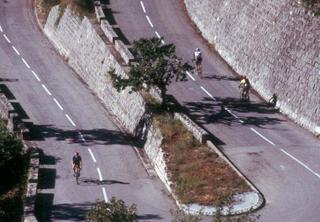
As we are pedaling along, all we can see is a road in front of us because our senses are limited by the retaining walls necessary to keep the switchbacks from collapsing and blocking the road. After pedaling for some time, we finally get to the Temple of the Sun. Checking our pedometer, we see that we have pedaled 5 miles. So we conclude that the Temple of the Sun is farther away from Earthbound than Moon City, which is only 2 miles.
The next day, we met someone who has just returned from an airplane ride over the area. He tells us that the Temple of the Sun is actually closer to Earthbound than Moon City. He measured it from the air where he could see that a straight line up the mountain from Earthbound to the Temple of the Sun is only one mile.
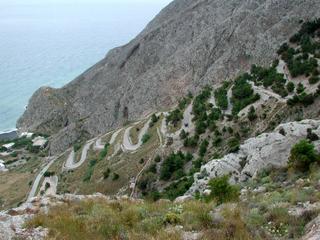
Since we can't fly up the mountain, for practical purposes it is five miles away, but by hearing from higher authority, we can understand that it is also only one mile away as the parrot flies. Ergo, Moon City is simultaneously nearer to, and farther from, Earthbound than the Temple of the Sun.
Tuesday, October 18, 2005
He Held Radical Light
He held radical light
as music in his skull: music
turned, as
over ridges immanences of evening light
rise, turned
back over the furrows of his brain
into the dark, shuddered,
shot out again
in long swaying swirls of sound:
reality had little weight in his transcendence
so he
had trouble keeping
his feet on the ground, was
terrified by that
and liked himself, and others, mostly
under roofs:
nevertheless, when the
light churned and changed
his head to music, nothing could keep him
off the mountains, his
head back, mouth working,
wrestling to say, to cut loose
from the high unimaginable hook:
released, hidden from stars, he ate,
burped, said he was like any one
of us: demanded he
was like any one of us.
(A.R.Ammons)
Monday, October 17, 2005
Saturday, October 15, 2005
Turmeric Is an Effective Preventative

Asian spice shows promise in combating cancer, other ailments
By Frank Greve Knight Ridder Newspapers
"WASHINGTON - Turmeric, the Asian spice that makes curry yellow, not to mention French's mustard and Hindu priests' robes, has yet another life: It's a promising potential weapon against several cancers, Alzheimer's, cystic fibrosis, psoriasis and other diseases.
"We know that it's an effective preventive at low doses," said Dr. Bharat Aggarwal, of the experimental therapeutics department at the M.D. Anderson Cancer Center in Houston. "The question is whether larger doses can be therapeutic" for disease sufferers.
At least a dozen clinical trials on humans are under way in the United States, Israel and England to test the safety and dosages of turmeric's main ingredient, curcumin. It's a hot topic in health journals, too, cited 967 times since 2000 in articles reported on PubMed, the National Library of Medicine's research service..."
Friday, October 14, 2005
Important Warning! Dihydrogen Monoxide Danger
As Dihydrogen Monoxide is routinely used daily in all our homes and temples, the following article is extremely important:
Full Article on Dihydrogen Monoxide
"What is Dihydrogen Monoxide?
Dihydrogen Monoxide (DHMO) is a colorless and odorless chemical compound, also referred to by some as Dihydrogen Oxide, Hydrogen Hydroxide, Hydronium Hydroxide, or simply Hydric acid. Its basis is the unstable radical Hydroxide, the components of which are found in a number of caustic, explosive and poisonous compounds such as Sulfuric Acid, Nitroglycerine and Ethyl Alcohol.
For more detailed information, including precautions, disposal procedures and storage requirements, refer to the Material Safety Data Sheet (MSDS) for Dihydrogen Monoxide.
Should I be concerned about Dihydrogen Monoxide?
Yes, you should be concerned about DHMO! Although the U.S. Government and the Centers for Disease Control (CDC) do not classify Dihydrogen Monoxide as a toxic or carcinogenic substance (as it does with better known chemicals such as hydrochloric acid and benzene), DHMO is a constituent of many known toxic substances, diseases and disease-causing agents, environmental hazards and can even be lethal to humans in quantities as small as a thimbleful..."
Thursday, October 13, 2005
Staten Island Boat Graveyard

"Off the shore of Staten Island New York rests a veritable graveyard of decommissioned, scrapped, and abandoned ships of various sizes, ages, and states of decay. Things are constantly changing here; new boats are brought in and old ones are chopped up or sunk into the muddy banks of the harbor..."
Robert Gouiran: But the relic of a ship doesn't mean that the ship has been useless.
Prabhupada: Eh?
Yogesvara: His, he says...
Prabhupada: No, no. For the time being. It is useless... Actually, it is useless. But for the time being, we are taking as very useful. Just like the aeroplane. It is very useful. But as soon as crashed, where is the...? Whole thing is lost. And it will crash. Because everything material we are creating... Just like the big, big buildings. They're also crashed. The end is there. Anything material, it has got beginning, and it has got end. That is our point. So things which will end in due course of time, why we should waste our time in that way? And we are part and parcel of God. We have got different business. We have forgotten that. We are simply engaged in temporary castle building which will be relics after some thousands of years. So are we not wasting our time?
Room Conversation with Robert Gouiran, Nuclear Physicist from European Center for Nuclear Research -- June 5, 1974, Geneva
Wednesday, October 12, 2005
Huh? Wha? Anyway, You Got a Light?
Smoking associated with lower IQ, study finds:
"Smokers often say that smoking a cigarette helps them concentrate and feel more alert. But years of tobacco use may have the opposite effect, dimming the speed and accuracy of a person's thinking ability and bringing down their IQ, according to a new study led by University of Michigan researchers..."
This is only a preliminary study needing corroboration, but...
Tuesday, October 11, 2005
Tobacco Health Warnings at Museum of Modern Art
Canada's tobacco health warnings to be showcased at Museum of Modern Art
"OTTAWA - The Government of Canada's pictorial health warnings for tobacco packaging will be featured in a new exhibit entitled SAFE: Design Takes On Risk at The Museum of Modern Art (MoMA) in New York City. The exhibit will run from October 16, 2005 to January 2, 2006.
"Canada is an international leader in tobacco control with the introduction of the world's first pictorial health warnings," said Health Minister Ujjal Dosanjh. " I am very proud that these labels have been recognized as being among some of the most innovative contemporary designs in the world."...."
High resolution images of the graphic warnings.
Oh yeah, smoking kills. That's why I have blogged this. If you smoke, stop; if you don't, don't start. Addiction comes quicker than you can imagine.
Monday, October 10, 2005
For Sale
For Sale:
Was the heading of the ad
Placed in the free unclassifieds
Of the local free paper distributed
On convenience stores’ counters
Left in plastic tubes on rural routes
Read by housewives bored by routine
And good old boys looking for used trucks
“For Sale
Bridal Gown, unaltered and unused”
Perhaps it could have read
Unaltered and unaltared
An unforgiven infidelity?
A bride-to-be killed in a car by a drunk?
An activated reservist who bled out in Iraq?
The unanswered “Why” opens gates of poignancy
For Sale
Life goes on
Mouths must be fed
Rents paid, medicines bought
In cold dawns after sorrow
Reality reasserts for someone
Who can’t afford to pack it away
And pull it from a trunk in a grey future
(continued)
I wrote the above after reading an ad in the Green Tab, which is, as described, a free unclassified paper widely read locally. That was a couple of years ago. Since then, I have come across a much better variation on the theme, attributed to Hemingway who won a bet that he could write a short story in 6 words:
"For Sale: Baby shoes. Never worn."
Sunday, October 09, 2005
Saturday, October 08, 2005
Friday, October 07, 2005
US Outsourcing Prayers to India

The eagerly awaited 2005 Ig Noble awards were presented last night at Harvard University. While the winner of the Medicine category for prosthetic dog testicles has been getting all the buzz, I thought it fell short of two great winners at the 2004 awards. For those of you who didn't read my blog entry about them last year (which would be all of you, as I wasn't blogging until July of this year), I would direct you to scroll down the Ig Noble awards page and check out them out.
The most interesting 2004 award was the one for Psychology, "Gorillas in Our Midst", which is a study of "...sustained inattentional blindness for dynamic events." Perhaps I was drawn to this by my interest in Illusion, an ongoing subtext of my blog. Without Illusion, or its bedfellow "willing suspension of disbelief", how could any of our religious (and by "any" I mean "all"), political, social, or educational institutions exist? What to speak of stage magic.
The most amusing on all sorts of levels of the 2004 Ig Nobles was the one for Economics:
"With Roman Catholic clergy in short supply in the United States, Indian priests are picking up some of their work, saying Mass for special intentions, in a sacred if unusual version of outsourcing,"
Thursday, October 06, 2005
SUV Ads Aimed at Walter Mitty Types

I have recently been commenting how SUV ads are aimed at Walter Mitty types who live sedentary and/or artificial urban based lives who compensate for their quiet desperation and/or insecutities by buying large vehicles they really don't need.
One surprizingly common response is "Who is Walter Mitty?" so i have included a link to "The Secret Life of Walter Mitty", a very short story by James Thurber as this is a basic cultural archetype to be familiar with in this age.
"...He put his shoulders back and his heels together. "To hell with the handkerchief," said Waker Mitty scornfully. He took one last drag on his cigarette and snapped it away. Then, with that faint, fleeting smile playing about his lips, he faced the firing squad; erect and motionless, proud and disdainful, Walter Mitty the Undefeated, inscrutable to the last. "
Some reinforcement for my premise is found in the article entitled "Masculinity Challenged, Men Prefer War and SUVs"
Excerpt: "I found that if you made men more insecure about their masculinity, they displayed more homophobic attitudes, tended to support the Iraq war more and would be more willing to purchase an SUV over another type of vehicle," said Willer..."
Wednesday, October 05, 2005
Digging
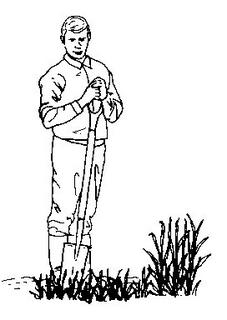
Digging
Between my finger and my thumb
The squat pen rests; snug as a gun.
Under my window, a clean rasping sound
When the spade sinks into gravelly ground:
My father, digging. I look down
Till his straining rump among the flowerbeds
Bends low, comes up twenty years away
Stooping in rhythm through potato drills
Where he was digging.
The coarse boot nestled on the lug, the shaft
Against the inside knee was levered firmly.
He rooted out tall tops, buried the bright edge deep
To scatter new potatoes that we picked,
Loving their cool hardness in our hands.
By God, the old man could handle a spade.
Just like his old man.
My grandfather cut more turf in a day
Than any other man on Toner's bog.
Once I carried him milk in a bottle
Corked sloppily with paper. He straightened up
To drink it, then fell to right away
Nicking and slicing neatly, heaving sods
Over his shoulder, going down and down
For the good turf. Digging.
The cold smell of potato mould, the squelch and slap
Of soggy peat, the curt cuts of an edge
Through living roots awaken in my head.
But I've no spade to follow men like them.
Between my finger and my thumb
The squat pen rests.
I'll dig with it.
(Seamus Heaney)
Tuesday, October 04, 2005
Chant Hare Krishna and Be Happy
Srila Prahbupada often said "Chant Hare Krishna and be happy." This points out the need for both spiritual and material advancement of consciousness. The article "So what do you have to do to find happiness?" explores happiness, largely from a biochemical perspective. It is a long article, and needs to be read with an open mind, which is to say, a mind that isn't prone to the "Aha" self righteous finger pointing of dogma. As it is long, I have excerpted a few tidbits:
"Their holy grail is the classification of strengths and virtues. After a solemn consultation of great works such as the samurai code, the Bhagavad-Gita and the writings of Confucius, Aristotle and Aquinas, Seligman's happiness scouts discovered six core virtues recognised in all cultures: wisdom, courage, humanity, justice, temperance and transcendence. They have subdivided these into 24 strengths, including humour and honesty..."
"At the Royal Institution, Nettle explained how brain chemistry foils our pursuit of happiness in the modern world: 'The things that you desire are not the things that you end up liking. The mechanisms of desire are insatiable. There are things that we really like and tire of less quickly — having good friends, the beauty of the natural world, spirituality. But our economic system plays into the psychology of wanting, and the psychology of liking gets drowned out.' ..."
"In essence, what the biology lesson tells us is that negative emotions are fundamental to the human condition, and it's no wonder they are difficult to eradicate. At the same time, by a trick of nature, our brains are designed to crave but never really achieve lasting happiness..."
Monday, October 03, 2005
Marriage Is Not Gazing Into Each Other's Eyes
 This past weekend we were set up selling my wife's handcrafted gourds at the World's Largest Gourd Show in Mt. Gilead, Ohio.
This past weekend we were set up selling my wife's handcrafted gourds at the World's Largest Gourd Show in Mt. Gilead, Ohio.While there we were invited to attend a wedding performed by a Micmac teacher in a traditional way. The bride and groom stood during the ceremony both wrapped in the same blanket. There was an exchange of traditional foodstuffs from the bride to the groom, and the groom to the bride. It ended with the newly wed couple giving gifts to the guests. A giveaway is often practiced at Native American ceremonies rather than accepting gifts.
The ceremony was held on a beautiful autumn day under a large sycamore tree that was estimated to be 200 years old.
As part of the teaching that the elder gave before the ceremony, he said, "Marriage is not gazing into each other's eyes, it is looking in the same direction. "





